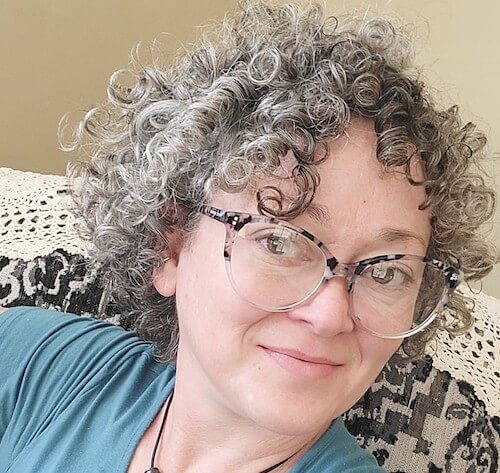Human hair ages just like our bodies do. Melanocytes that make the hair color pigment cells eventually begin to slow or stop creating these pigments altogether, causing your hair to turn gray, silver or white. But what if this rapidly starts in your teens or 20s? That can come as quite a shock!
VEGAMOUR spoke with an expert to find out why some people turn gray at such early ages and if there's anything you can do to prevent it. Plus, discover what products can help preserve your natural hair color for longer.
What Is Premature Gray Hair?
VEGAMOUR consulted with Dr. Jaspreet Oberoi, a pathologist and the founder of Life Pathdoc to find out what constitutes premature graying and what might cause this phenomenon.
"Gray hair (also called canities or achromotrichia) occurs due to loss of melanin pigment. Melanin pigment gives color to our hair," said Dr. Oberoi.
He also explained what you might expect if you are, in fact, prematurely aging. "Normally as we age, we lose this pigment and graying of hair happens. However, in some people, this can occur at a younger age leading to premature gray hair. For Caucasians, it is before 20 years of age, and for African-Americans, it is before 30 years of age."
While your unique genetic makeup plays a considerable role in when (and how much) your hair will gray, there are other factors that you do have some control over. Meaning, you can eliminate some risk factors (or lessen them) so that you might retain your natural hair color for a bit longer.
Related Reading: How to Stop Gray Hair Naturally
What Makes Hair Turn Gray?
Every gray hair goes through the same process, whether you end up with a full head of silver hair, streaks of white hair or grayish-looking blonde hair.
Hairs begin with healthy melanocytes and hair follicles. Think of these as a "home base" for melanin production. Melanin is the hair pigmentation that makes up the coloring of your hair strands. Over time, as a part of the natural aging process, the melanocytes begin to slow, giving a "washed out" blend of your natural color pigments due to a lack of pigment cells. The more severe this slowing (or stopping) is, the more your natural color will fade from the hair. Complete loss of melanin results in white hair. If this process begins or rapidly develops at a young age, it's called "premature" graying.
This hair aging process is very different from using hydrogen peroxide, hair color or bleach solutions to lighten the hair. During these chemical processes, the hair's pigment cells, along with some of the hair's structural proteins, are reduced or destroyed to make the hair lighter. Hair that has lost pigment in these ways cannot, then, restore the pigments on the affected areas of the hair shaft. However, the new hair that grows in will have the natural pigments present. This process, then, is not a part of the normal aging process but a chemical alteration of the hair pigments.
Though the aging of your hair is normal, there are myriad factors that can speed up the loss of pigment in your hair.
Related Reading: Why Does Hair Turn Gray?
What Contributes to the Premature Graying Process?
Those first silvery strands might come as a shock no matter your age and family history. But if you're seeing the first gray hair very early, followed by many more in rapid succession, you could begin to wonder if your health is in trouble. And you're not completely wrong. Premature hair graying could be a sign that there's some underlying condition (or a lifestyle choice) that's harming your health that needs to be addressed.
Some of the more common causes of premature hair graying include:
- Oxidative stress such as environmental factors, environmental pollution, exposure to free radicals, sunlight exposure, inflammatory diseases and emotional factors such as psychological stress
- Progeroid syndromes which affect the body's ability to repair DNA
- Nutritional deficiencies such as vitamin B (lack of vitamin B12, specifically, also called pernicious anemia), D3, calcium, copper, iron and zinc
- Thyroid disorders or autoimmune illnesses such as Addison’s disease, vitiligo, Grave’s disease and Werner’s syndrome
- Some types of medication such as chemotherapy drugs and antimalarials
- Low HDL cholesterol
- Neurofibromatosis
- Tuberous sclerosis
- Cardiovascular disease
- Smoking (sometimes called "smoker's hair") or excessive alcohol consumption
Shop: GRO AGELESS Gray Delay Hair Supplement
Does Alopecia Areata Cause Premature Hair Graying?
With alopecia areata, the hair follicles are attacked by the immune system and before the hairs fall they often turn a lighter color or a gray color. This is one of many side effects of the disorder and isn't necessarily the same thing as premature graying. Having said that, many of the strategies for caring well for your hair follicles in the case of premature graying would also apply to those with this condition.
How to Care For Gray Hair
The best thing you can do to help your hair, your skin and your overall health is to live a healthy lifestyle. Yes, this might mean changing the way you eat and getting good sleep — as a priority! All of these healthy lifestyle choices add up over the course of your aging and influence how quickly your hair follicles will weaken and produce not only less melanin but also less hair. Here are some of the best things you can do for your hair and overall health:
- Limit alcohol consumption
- Protect your hair from UV rays by wearing a hat
- Eat a well-balanced diet and see your doctor about any nutritional deficiencies or underlying medical conditions you might have
- Avoid cigarette smoke and other forms of pollution
Secondly, you might want to switch out your hair products. What you put on your hair each and every day presents an opportunity for you to deliver nutrients and specialized care for your hair's needs. A healthy scalp biome is necessary to protect the hair follicles, stimulate the growth of stem cells, keep hairs in the growing phase longer (which slows hair loss) and also to maintain the healthiest hair shaft possible.
If you love your dark hair, it's possible for you to keep your natural pigmentation even longer. One vegan solution that's sulfate-free, phthalate-free and free of toxins is VEGAMOUR's GRO AGELESS collection. It's designed to help your hair keep its pigmentation longer. Phytoactives and plant-based proteins also feed your scalp the nourishment it needs for healthy hair growth.
GRO AGELESS Gray Control Duo is the perfect place to start. Feed your hair with collagen and delay going gray with the serum and supplement. This dynamic duo can actually reduce the appearance of gray hair on new hair growth. This means that if you've suffered some unnecessary pigment loss, you could restore a more youthful look to your hair!
Get Educated About Gray Hair
VEGAMOUR is a wellness company that embraces hair beauty of all types, aiming to replace conventional hair care products with superior plant-based ones that are kinder for the environment and for your scalp. You can find all sorts of tips for caring for different hair types — including aging hair — on our hair wellness educational blog.
#include-related-slider#
More from VEGAMOUR:
- Shop: The Best Products for Graying Hair
- 8 Gray Hair Myths You Need to Know
- What's the Average Age for Getting Gray Hair?
- If You Pull Out Gray Hair, Will More Grow?
- How to Reverse Gray Hair
Photo credit: Andrea Piacquadio/Pexels
Back



















